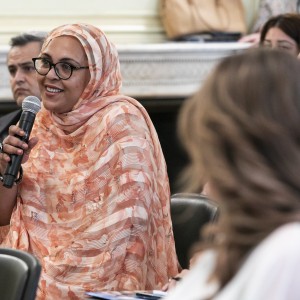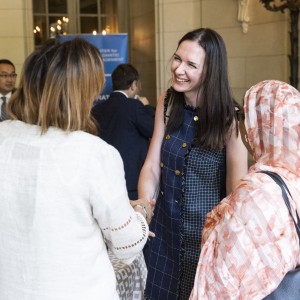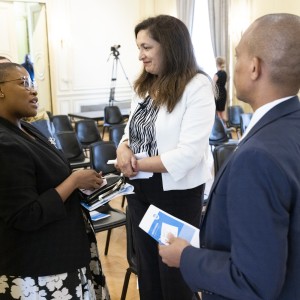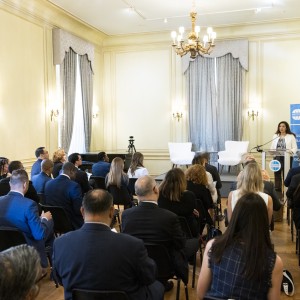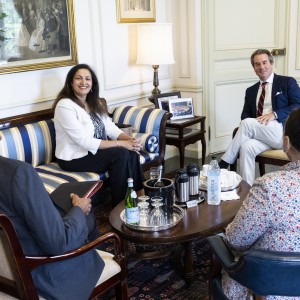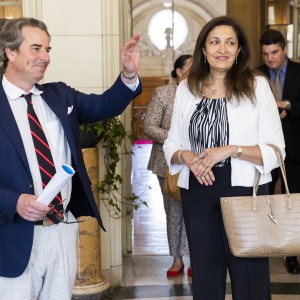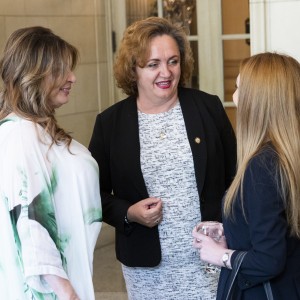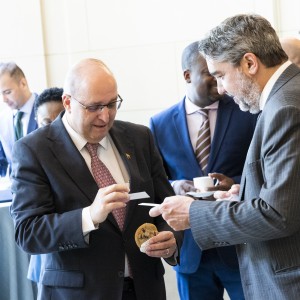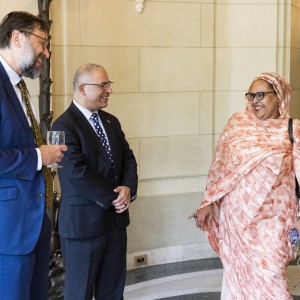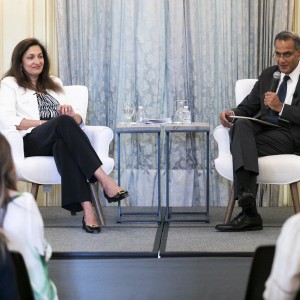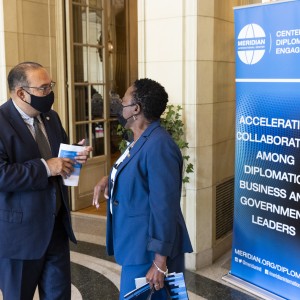Under Secretary Uzra Zeya Discusses How to Renew Democracy Around the World at Meridian
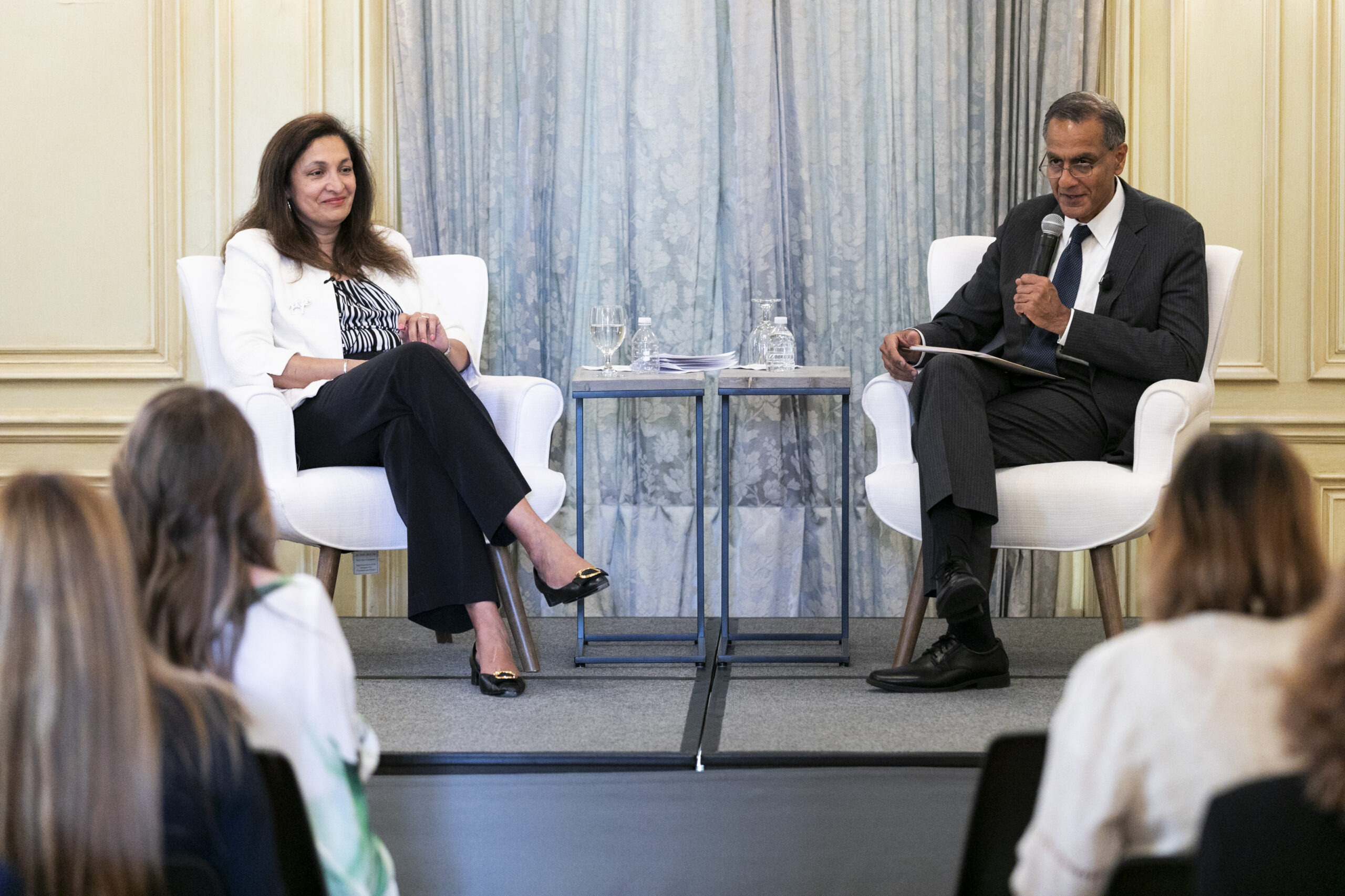 Under Secretary of State for Civilian Security, Democracy, and Human Rights Uzra Zeya engaging in a fireside chat with Ambassador Richard Verma (Mastercard) at an Insights@Meridian in Washington, DC, on June 24, 2022.
Under Secretary of State for Civilian Security, Democracy, and Human Rights Uzra Zeya engaging in a fireside chat with Ambassador Richard Verma (Mastercard) at an Insights@Meridian in Washington, DC, on June 24, 2022.
In the last 16 years, there has been a backslide of democracy around the world. From reduced domestic freedoms to the growth of autocratic regimes, democracy and human rights have been under duress. Renewing democracy has quickly become the defining challenge of our time and is crucially linked to economic stability and success.
Under Secretary of State for Civilian Security, Democracy, and Human Rights Uzra Zeya spoke about progress made since the first Summit for Democracy last year and discussed how collective action can help to renew democracy in a fireside chat Moderated by Ambassador Richard R. Verma, Counsel and Head of Global Public Policy at Mastercard at Meridian on June 24.
Here are some top takeaways from the program:
1. The Defining Challenge of Our Time
At the 2021 Summit for Democracy, President Biden remarked that renewing democracy is the “defining challenge of our time.” In the last 15 years, there has been democratic backsliding around the world. Challenges to democratic governance are intertwined with other coinciding challenges, such as Russia’s invasion of Ukraine which is creating ripple effects including a refugee crisis and increased food insecurity. Renewing democracy and battling economic insecurity requires simultaneous effort and commitment.
2. Successes From the Inaugural Summit for Democracy
Two months after last year’s first Summit for Democracy, the largest gathering of world leaders the United States has ever convened, participating governments, including the United States, put forth more than 740 commitments to strengthen democracy. The commitments kickstarted the Department of State’s “Year of Action,” that focused on three main themes 1) defending against authoritarianism, 2) addressing and fighting corruption, and 3) promoting human rights. Following the Summit, countries established their own agendas and initiatives to support democracy, such as Botswana’s regional conference on constitutionalism and democratic consolidation in July 2022.
3. Global Collaboration and Civil Society are Vital for Democracy
Building and maintaining strong global partnerships to foster deeper collaboration between allies is being as a tool to fight autocracy. Democracy cohorts, part of the “Year of Action” were formed between different actors in the international sphere. The democracy cohorts work together to fulfill Summit commitments, with cohorts being made up of civil society, and government and private sector actors. Civil society is also a vital partner in the democracy cohorts, encouraging public collaboration and input. Civil society engagement helps hold government actors accountable and encourages them to stick to their global commitments, particularly as it relates to transparency.
4. Private Sector Engagement
The private sector has been working alongside governments and multilateral organizations to support democratic endeavors and assist in humanitarian crises including reception Afghan and Ukrainian parolees, leveraging their unique expertise and resources. In addition, 40 countries joined U.S. Vice President Harris’ “Call to Action” to help create economic opportunity in northern Central America through more than $3 billion in private sector investments. Private sector collaboration and investment is a tool that can act as an alternative to potential financial investments from autocratic countries, thereby protecting and supporting democratic governance.
5. Modernizing the Foreign Policy Toolkit
To face 21st century challenges, the U.S. government is modernizing foreign assistance and policies approaches and tools. Staying on top of digital technologies is essential, as these tools are already being manipulated by authoritarian regimes, including as surveillance mechanisms that reduce freedoms and threaten human rights. The U.S. will succeed Canada as Chair of the Freedom Online Coalition in 2023, working to continue protecting and promoting internet freedom.
This program is generously supported by Mastercard.
Project summary
| Under Secretary Uzra Zeya Discusses How to Renew Democracy Around the World at Meridian | June 2022 | |
|---|---|
| Number of Attendees: | 30 |
| Regions: | Western Hemisphere, East Asia and Pacific, Europe and Eurasia, Africa, South and Central Asia, Near East and North Africa |
| Countries: | Ecuador, Greece, Jordan, El Salvador, Kazakhstan, Bolivia, Mauritania, Benin, Cameroon, Albania, Slovakia, Algeria, Belgium, Poland, South Africa, Armenia, Australia, Costa Rica, Botswana, Saint Kitts and Nevis, Liechtenstein, Argentina, Montenegro, Tunisia, Colombia |
| Impact Areas: | Governance and Transparency, Foreign Policy, Human and Civil Rights, Civic Engagement |
| Program Areas: | Diplomatic Engagement |
| Partners: | Diplomatic Corps, Private Sector |

